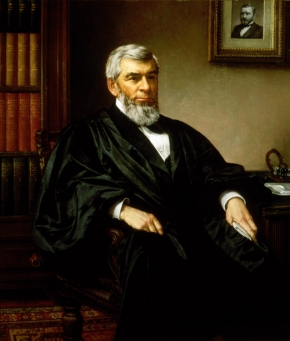You are here
Circuit Court Opinions:
Chief Justice Morrison Remick Waite, United States v. Hermance (1878)

United States v. Hermance, 26 F. Cas. 290 (C.C.S.D.N.Y. 1878) (No. 15,355) [Second Circuit]
Although Chief Justice Waite was allotted to the Fourth Circuit, he also heard many cases in the Second Circuit, encompassing Connecticut, New York and Vermont, while filling in for Justice Ward Hunt, who had a stroke in 1875. One such case was Hermance, which involved a rogue tax collector.
John P. Curtis was a federal tax collector in New York. In 1875, several brandy distillers visited his office to pay the taxes due on their products and receive in return the stamps they were required to affix to the casks before they could be sold. Curtis was not in, so his deputy collected the payments, issued receipts, and informed the men that they would receive their stamps at a later time. Soon after, Curtis took the money and fled, without ever having reported the payments to the government or issuing the stamps.
Curtis had posted a performance bond, i.e., a guarantee that specified duties would be carried out, backed by a promise to pay those to whom the duties were owed in the event of a default. After he absconded, the United States brought an action on the bond to recover from the sureties who had assumed financial responsibility for Curtis’s performance. The case was first heard in the U.S. district court, which found for the defendants. On appeal to the circuit court, the question before Waite was whether the distillers, having given their money to the deputy collector, had in fact paid their taxes. If they had, the stolen money would be considered public funds, and the sureties would be obligated to repay the United States.
Waite reasoned that the transaction was intended to be something more than a mere tax payment. “In effect,” he argued, “it is the purchase from the collector, by the distiller, of stamps which must be affixed to the packages before the spirts they contain can be put upon the market and sold.” He explained that simply paying the amount due did not accomplish any purpose for the distiller but instead was only a means to get the required stamps. Until the distillers received their stamps, they had the right to withdraw their money from the collector. Thus, the transaction in question had not been completed, and the money could not be considered the property of the United States. Waite therefore affirmed the district court’s judgment for the sureties. His opinion did not reveal how the matter was resolved with respect to the distillers, who had been issued stamps by an acting collector appointed after Curtis’s disappearance.
